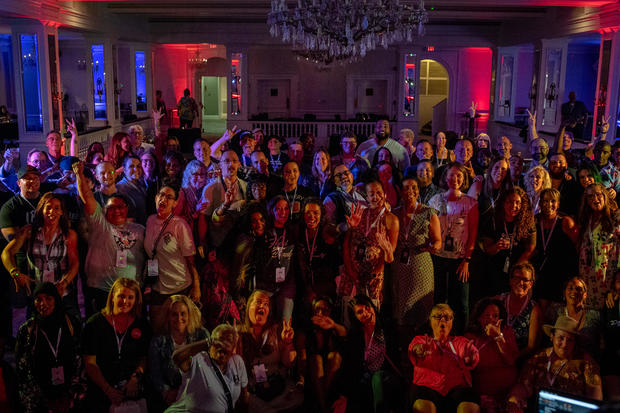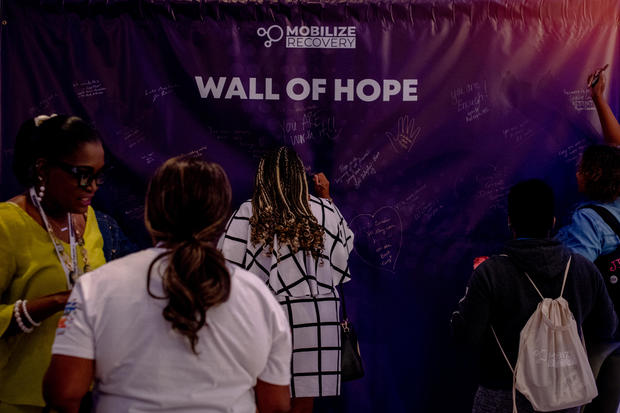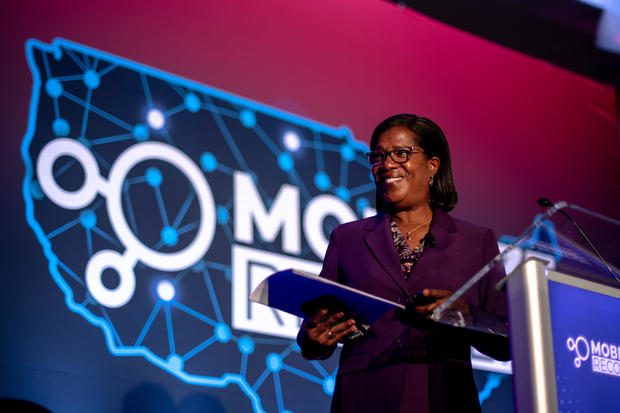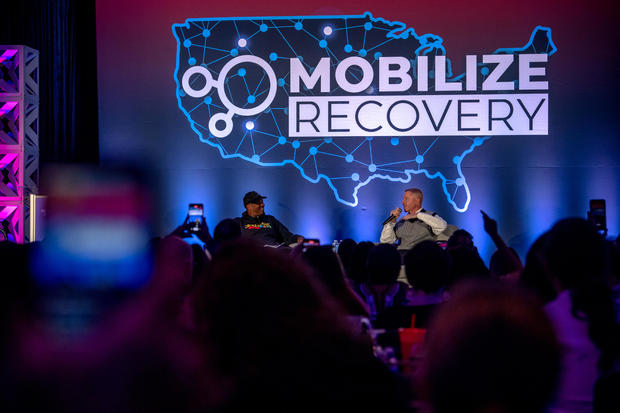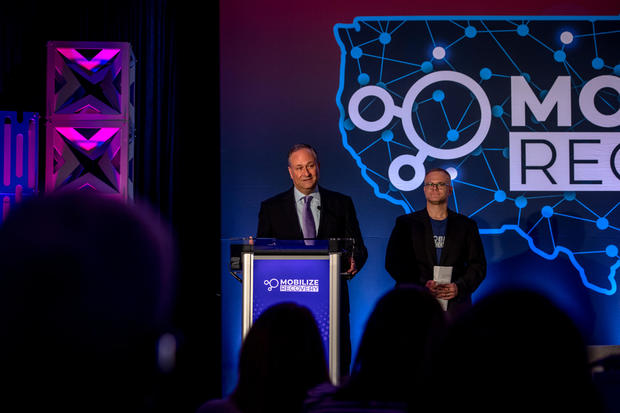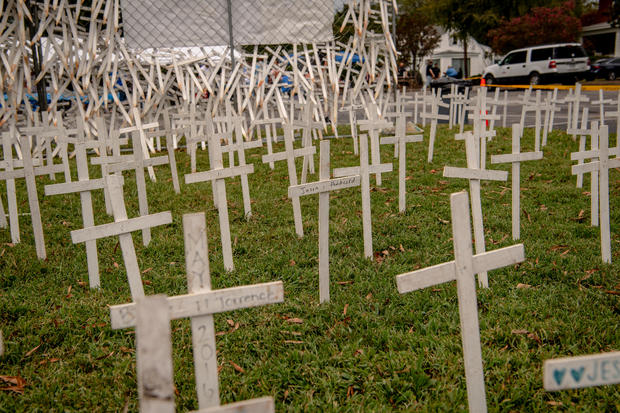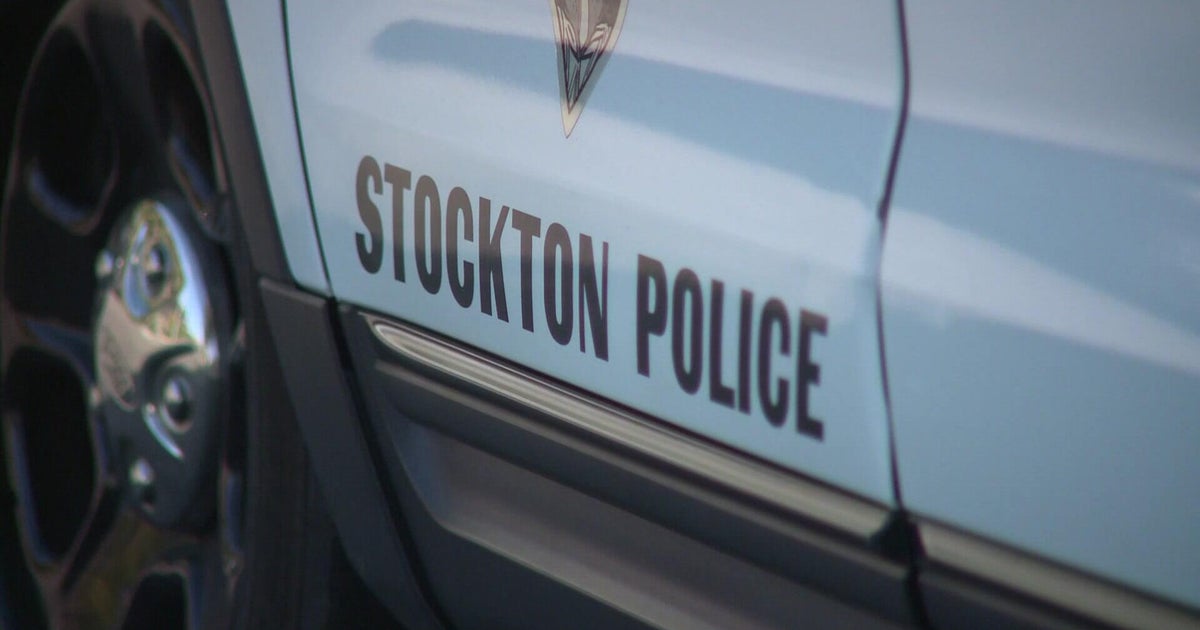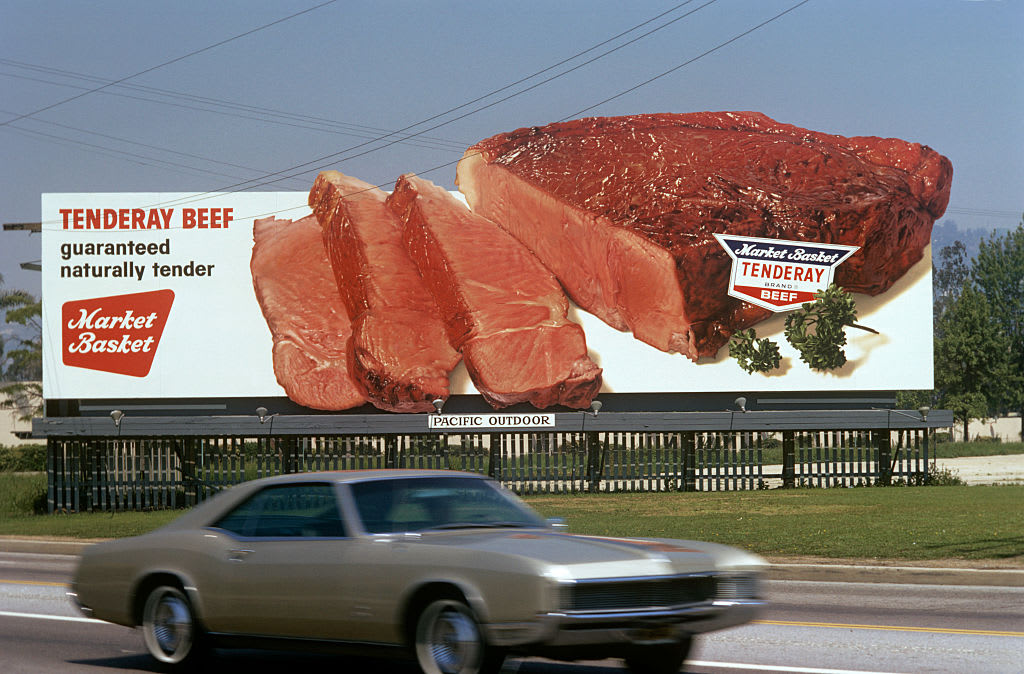Stigma kept people with substance use disorders "in the shadows." Now, they're fighting to "recover out loud."
Nearly three-quarters of the over 29 million adult Americans who identify as having substance use disorder are in recovery, new federal data shows. This weekend, hundreds of advocates in the field gathered in Washington, D.C. to call for political action and support for people in recovery, who make up a significant percentage of the population of U.S. adults.
The parties gathered at Mobilize Recovery, a conference now in its fifth year, hosted by a federal nonprofit organization of the same name. In addition to connecting people in the recovery field to each other, the conference aims to make people in recovery a visible, viable political group that can push for political and social change.
"Stigma has kept us silent and in the shadows, and as a result, people with our illnesses are in the shadows and are marginalized," said Patrick Kennedy, the former congressman from Rhode Island. Kennedy is in recovery from substance use disorder and was a member of the Trump administration's Commission on Combating Drug Addiction and the Opioid Crisis. "While we can remain anonymous in our own personal recovery, it doesn't mean that we can't be active citizens of our country and really fight for our fellows who are dying, especially today at record numbers."
On Wednesday, the Substance Abuse and Mental Health Services Administration released new data showing recovery rates from substance use. The data, provided exclusively to CBS News ahead of its publication, found that of the 29 million adult Americans who self-identified as having a substance use problem, 72.2% are in recovery. The data looked at ways to increase the number of people in recovery, including expanding access to substance use treatment and establishing community support networks and peer-led recovery groups.
What helps people enter recovery
People who got substance use treatment — which can include medication treatment, rehab or detoxing, or group situations like Narcotics Anonymous — recovered at higher rates than those who didn't, the research showed. People who needed treatment and did not receive it had a lower rate of recovery.
However, it's not just treatment that matters for people seeking recovery: The process is "clearly supported by a range of factors, including social, spiritual and somatic," SAMSHA said in the report announcing the data, requiring a "whole-health approach to facilitating recovery."
The report ended with several sets of policy recommendations across four categories. The suggestions included healthcare initiatives like expanding access to healthcare and substance use treatment, housing solutions like implementing accessible housing programs to support people in recovery, and social supports like creating community-based, peer-led support networks.
"We know that people don't recover alone. People recover in community," said Miriam E. Delphin-Rittmon, SAMSHA administrator.
Research on recovery and treatment is ongoing. Delphin-Rittmon said that the National Institute on Drug Abuse is currently studying the local impacts of overdose prevention centers. Federal officials are also working to expand access to medication treatment for substance use disorder, Delphin-Rittmon said, which has been shown to help people enter long-term recovery. Health and Human Services Secretary Xavier Becerra told CBS News that between October 2021 and December 2022, the number of physicians able to dispense buprenorphine, one of the medication treatments, has increased by 19%. Becerra said that he expects that number to rise because former barriers to prescription have been removed.
Federal officials have also launched an "Office of Recovery," Becerra said. The office "promotes a recovery-oriented system of care," according to SAMHSA's website, and its initial objectives focus on some of the solutions proposed in the new report.
"We know recovery is real, and it's possible. We know people are able to recover. People do recover. They're living full, happy, healthy, productive lives," Delphin-Rittmon said. "I think that's an important message. ... It's important for people to have hope and to reach out, to get support and assistance if they're struggling, because they're certainly not alone. There's a vibrant recovery community to embrace and work with them."
How substance use recovery looks different
The more than 500 organizers from all over the country at the Washington, D.C. event discussed a wide range of topics, from how to speak to teenagers about fentanyl and substance use to how best to divide opioid settlement funds being poured into states. Some groups were there to connect with parents and loved ones of people who use drugs, and others were there to support people actively using substances — and many are in recovery themselves. Some advocated for harm reduction solutions, like overdose prevention centers where people can use drugs in sterile, supervised environments, while others were from organizations that support abstinence-based recovery.
"When I got sober, we were in smoky church basements. That's what it looked like," said Jan Brown, who has been in recovery for 36 years and operates a recovery community organization in Williamsburg, Virginia. "Now, to be able to recover out loud ... It's pretty remarkable."
Rapper and advocate Macklemore lent the event some celebrity sparkle, speaking candidly about his own substance use and recovery in a fireside chat on Monday night.
Also in attendance were members of Congress, including Democrats Rep. Rashida Tlaib of Michigan, Rep. Paul Tonko of New York and Rep. Debbie Dingell of Michigan. Director of the White House Office of National Drug Control Policy Dr. Rahul Gupta and second gentleman Doug Emhoff made remarks on Tuesday, while Becerra spoke to attendees on Monday afternoon.
"Mobilize Recovery is an example of what is possible when people come together with a shared desire to help others," Becerra told CBS News. "They serve as a model for others."
Heather Ogden, an advocacy coordinator at the National Center for Advocacy and Recovery, said that seeing so many policymakers and organizers at the event brought a "sense of relief."
"We are getting attention from the people that make decisions. Decision makers, people in positions of power, are finally paying attention to the stuff that a lot of people ... have been saying for many, many years," said Ogden, who has been in recovery for more than 13 years. "There's a sense of relief that people are listening."
The fight for political recognition
Almost every attendee of Mobilize Recovery who spoke to CBS News was working towards a project or goal in the recovery space. Tina Fratus, a mother who fought her own addiction as a teenager and whose children used drugs, is part of a state task force in Rhode Island that is opening the state's first overdose prevention site. Cortney Lovell and Alexandra Plante, from the National Council for Mental Wellbeing, are set to release a national campaign to reach out to members of the Black and Latino communities who are at risk for substance use.
Many were pushing for people in recovery and people who use drugs to be seen as a constituency in their own right. About 8.6% of the U.S. adult population is in recovery, per data from SAMHSA and the Census Bureau, and advocates said this means it's a group of people who should be taken seriously.
"It's not about party or political affiliation ... There are more than 23 million people across the country who are in long-term recovery or who use drugs, and we vote. Not only do we vote, we run for office," said Courtney Gary-Allen, the organizing director of the Maine Recovery Advocacy Project. "We are a strong voting bloc, and we need action from our elected officials. More than that, we're also going to run for office." She said she hopes in a decade, there will be hundreds of elected officials with lived experience who will be the decision-makers.
At Mobilize Recovery, Gary-Allen announced "Run For Recovery," a yearlong training program that will teach people in recovery and their family members how to run for local office. The program will support 15 candidates in 2024, she said.
"For over a decade, the recovery community has been fighting to get ourselves a seat at the table," said Gary-Allan, who has been in recovery since 2016. "We can no longer wait for other people to make good policy decisions for our community. Instead, we need to be the actual decision-makers. It makes me super excited to see people in recovery running for office as one actionable step to decrease overdose deaths and get our community really in the middle of their local politics, making decisions on how to address this crisis."
Kim Govak, a programs manager at Faces & Voices of Recovery, said that she was thrilled the event "put a spotlight on recovery" and hoped that the momentum of the event, as well as national efforts, would lead to change around the country.
"Look at what all these people are doing. Look at how all these people are representing their states," Govak said. "We can help people see themselves and think 'That looks like it's possible for me. I see folks who look like me. Maybe this is for me.'"
